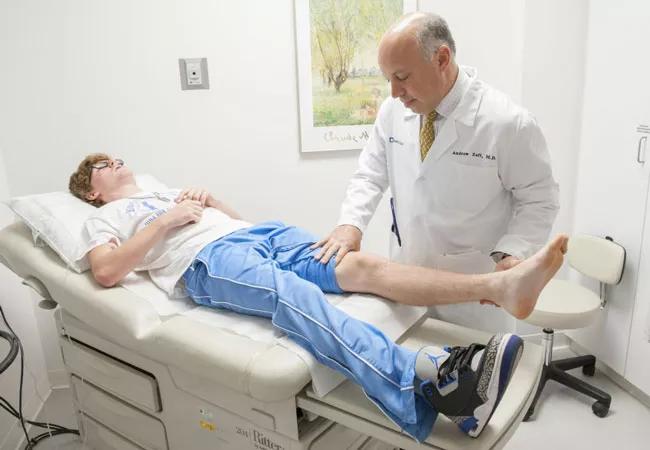Fellows will train under faculty with broad range of expertise

Image content: This image is available to view online.
View image online (https://assets.clevelandclinic.org/transform/3d405094-1a02-4fbb-96d0-28a28aabdd7b/CQD-4235419-Rheumatology_jpg)
CQD-4235419-Rheumatology
Cleveland Clinic Children’s has been accredited by the Accreditation Council for Graduate Medical Education (ACGME) for a three-year fellowship in pediatric rheumatology. The new program is funded through Cleveland Clinic Children’s with the support of a workforce expansion grant from the Rheumatology Research Foundation.
Advertisement
Cleveland Clinic is a non-profit academic medical center. Advertising on our site helps support our mission. We do not endorse non-Cleveland Clinic products or services. Policy
Applications are currently being accepted for the fellowship through the Electronic Residency Application Service® (ERAS®), with the formal fellowship match process occurring in December. The first fellow will start in the summer of 2024. Candidates must be graduates of an ACGME-approved residency in the United States.
“Pediatric rheumatology is a small subspecialty,” says Angela Robinson, MD, MPH, a pediatric rheumatologist at Cleveland Clinic Children’s and program director of the fellowship. “There are about 300 of us in the country, so there’s a pretty significant workforce shortage.” By 2030, this scarcity of providers is expected to increase by 20%.
Pediatric rheumatologists are needed because they are skilled at treating children in their developmental stages. “There are things that can happen to a child’s skeleton when they have arthritis that are different than an adult who’s fully grown,” Dr. Robinson says.
Additionally, the medication doses and complications are different for kids. Even the diseases themselves are slightly different considering most adults with rheumatoid arthritis have a positive rheumatoid factor and most children do not.
Adult rheumatologists who have not treated many children may also be hesitant to prescribe them newer medications because they’re off label. “Biologics have exploded the landscape of what we can do for our kids,” says Dr. Robinson.
In the United States, there are parents and children who must drive across multiple states to get this specialized care. Regionally, this is the only pediatric rheumatology fellowship program available in northeast Ohio, an area that includes Ohio’s second most populated county, Cuyahoga County.
Advertisement
“This is a specialty that’s highly needed,” says Dr. Robinson. “We’re the ones who are consulted when others can’t figure out what’s going on. We’re kind of the armchair detectives of the pediatrics world.”
During the first year of the fellowship, clinical training is the focus, but there will also be two one-month blocks dedicated to research. As is standard for pediatric fellowships, the second and third years will be devoted to research.
To aid in their project development and progress, fellows will regularly meet with a personalized Scholarship Oversight Committee and have multiple opportunities to present their research. They will be involved in every aspect of patient care as primary caregivers and consultants within the Department of Pediatric Rheumatology.
Fellows will also have opportunities to apply for research and training grants from the Arthritis Foundation, the Childhood Arthritis and Rheumatology Research Foundation, the Rheumatology Research Foundation, and the American College of Rheumatology.
“The advantage of Cleveland Clinic is that it already comes with one of the top adult rheumatology departments in the nation, which makes our program stronger,” says Dr. Robinson.
Along with this is a faculty of pediatric rheumatologists specializing in transitional care, musculoskeletal ultrasound, auto inflammatory disease, vasculitis, and epidemiology. “Within our five faculty, we have a wide breadth of expertise,” Dr. Robinson says.
Another benefit comes from Cleveland Clinic’s global reputation, which Dr. Robinson says spurs people from all over the world to come for second and third opinions. This gives fellows the opportunity to observe and participate in unusual cases.
Advertisement
As the former pediatric rheumatology fellowship program director at Rainbow Babies and Children’s Hospital in Cleveland, Dr. Robinson is well equipped to oversee this program. “The reality is all of us have experience with training fellows, so this fellowship program is not as new as it sounds on paper,” she says.
“Dr. Robinson is uniquely qualified to launch, implement and sustain the fellowship in pediatric rheumatology at Cleveland Clinic,” says Andrew Zeft, MD, MPH, Division Chief of Pediatric Rheumatology at Cleveland Clinic Children’s. “She continues to impress with high-value educational research and her personal dedication to teaching residents.”
“We get to really improve the quality of children’s lives when they have these chronic, incurable, rare diseases,” says Dr. Robinson. “We foster long-term relationships with our patients, and we get to watch them grow and vastly improve and hopefully go on to lead fulfilling lives.”
Advertisement
Advertisement
New clinic meets Hispanic patients where they are
Collaboration was key to identifying source of nerve condition
When to suspect concurrent giant cell arteritis
New research explores the role of immune cell and blood-brain barrier changes
Significant advances had a direct impact on clinical practice
Adam Brown, MD, shares his passion for solving rheumatologic mysteries
A look at how personal stories sparked an enterprise-wide cultural reset
Interdisciplinary program fosters high-performance teams